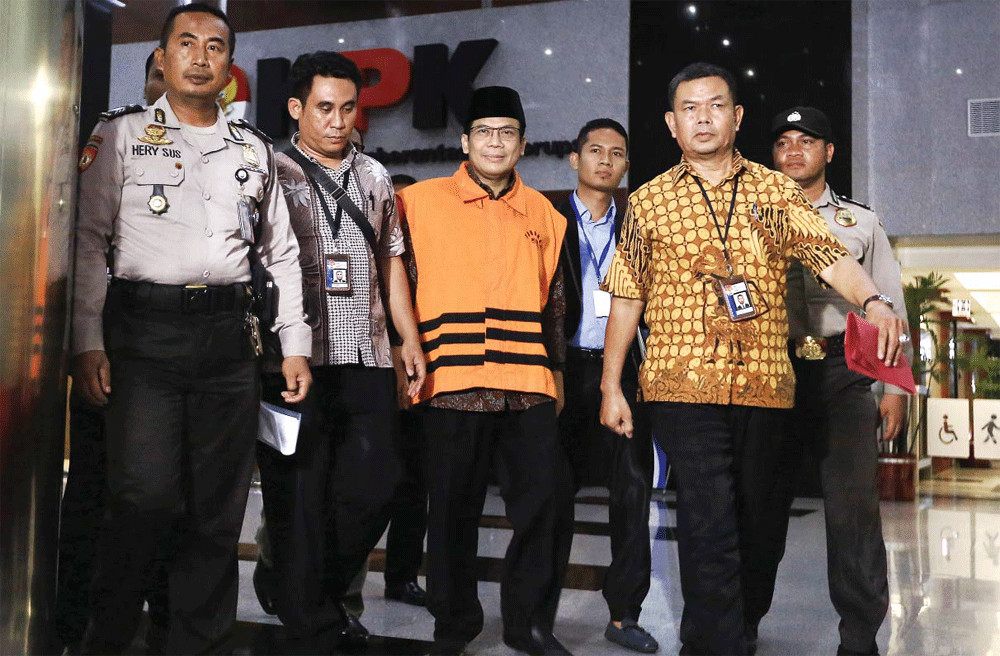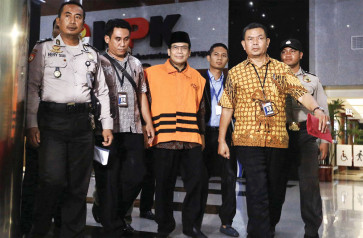Popular Reads
Top Results
Can't find what you're looking for?
View all search resultsPopular Reads
Top Results
Can't find what you're looking for?
View all search resultsWhy infrastructure projects prone to graft
What has allowed such rampant corruption to occur? It is a combination of factors: an uncritical press and culture.
Change text size
Gift Premium Articles
to Anyone
 Orange is the new black: The Corruption Eradication Commission (KPK) named former House of Representatives deputy speaker Taufik Kurniawan a suspect in a graft case surrounding the deliberation of the regional budget of Kebumen in Central Java, making him the second House leader implicated in corruption. (The Jakarta Post/Dhoni Setiawan)
Orange is the new black: The Corruption Eradication Commission (KPK) named former House of Representatives deputy speaker Taufik Kurniawan a suspect in a graft case surrounding the deliberation of the regional budget of Kebumen in Central Java, making him the second House leader implicated in corruption. (The Jakarta Post/Dhoni Setiawan)
P
resident Joko “Jokowi” Widodo has cast himself as an infrastructure president, and spent big on infrastructure development since he took office in 2014. In addition to major infrastructure projects, he has also promoted the use of village funds (dana desa) for local, small-scale infrastructure projects.
The 2014 Village Law was passed under Jokowi’s predecessor, Susilo Bambang Yudhoyono, but it was enacted only in 2015. The government has increased its annual budget allocation for the village funds since the program began, from Rp 20.67 trillion in 2015 to Rp 46.98 trillion in 2016, to Rp 60 trillion in 2017 and in 2018, and to Rp 70 trillion in 2019.
According to the Indonesia Corruption Watch (ICW), the abuse of these funds has also increased rapidly. The ICW recorded 181 corruption cases in 2015-2018 that involved 184 suspects and incurred losses of Rp 40.6 billion. Most of these cases ( 141 ) involved village heads. In Flores, for example, Petrus Kanisius, the now former head of Runut village in Sikka regency, was jailed for three years for embezzling almost Rp 380 million from the 2017 village fund.
I have conducted my own research through in-depth interviews with some key informants, such as retired civil servants, bureaucrats, politicians and contractors, to examine the extent of the corruption at the local level in Flores, East Nusa Tenggara (NTT). Corruption sometimes cases appear in local newspapers — especially media owned by the Catholic church, like Flores Pos, and which have not been co-opted by media oligarchs in Jakarta and is less controlled by political and economic elites at both local and national levels. Local journalists commented that the cases that made it to court were just the tip of the iceberg.
Bribery and kickbacks in the procurement process for public infrastructure projects are widespread in NTT. According to contractors and retired senior bureaucrats in Boawae, project contractors in Flores are often forced to provide up to 10 percent of the total project value to the heads of local legislative councils (DPRDs), regents or the heads of regency government offices before they are awarded contracts. In some cases, multiple officials each demand a 10 percent kickback, meaning that illicit payments can often exceed this amount, leaving much-reduced funds for actual construction.
I identified many examples of poor quality infrastructure that were built by central government-funded contractors during my field research. (These exclude locally funded infrastructure by villages in Flores, which generally had better quality because the villagers built them for themselves with funding from the village administration.)
In Nagekeo regency, for example, an office building in Boawae district remains vacant two years after construction finished. Officials say that they were afraid to use it because it began falling apart even before it was tenanted. In Borong, East Manggarai regency, the road connecting the villages of Lehong and Peot, built at a cost of Rp 9 billion, was in use for just one year before it was damaged by heavy rain, and has been impassable since 2017.

















